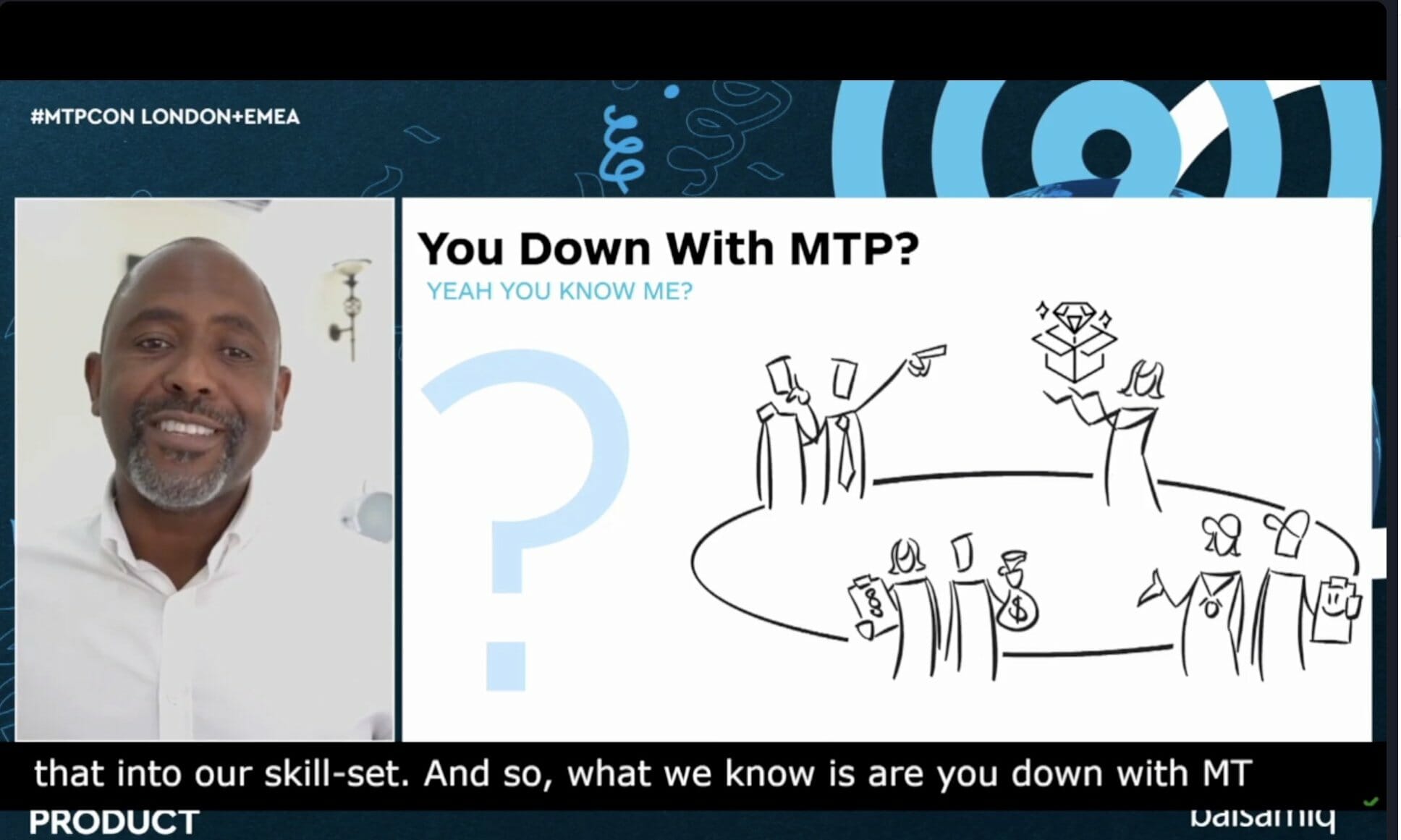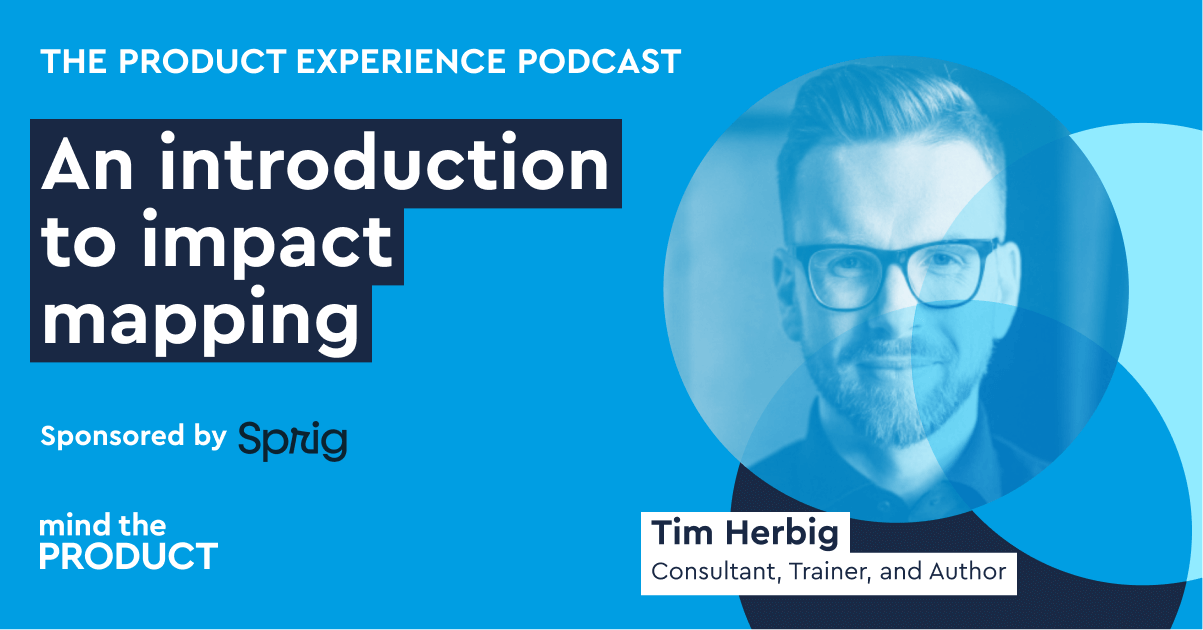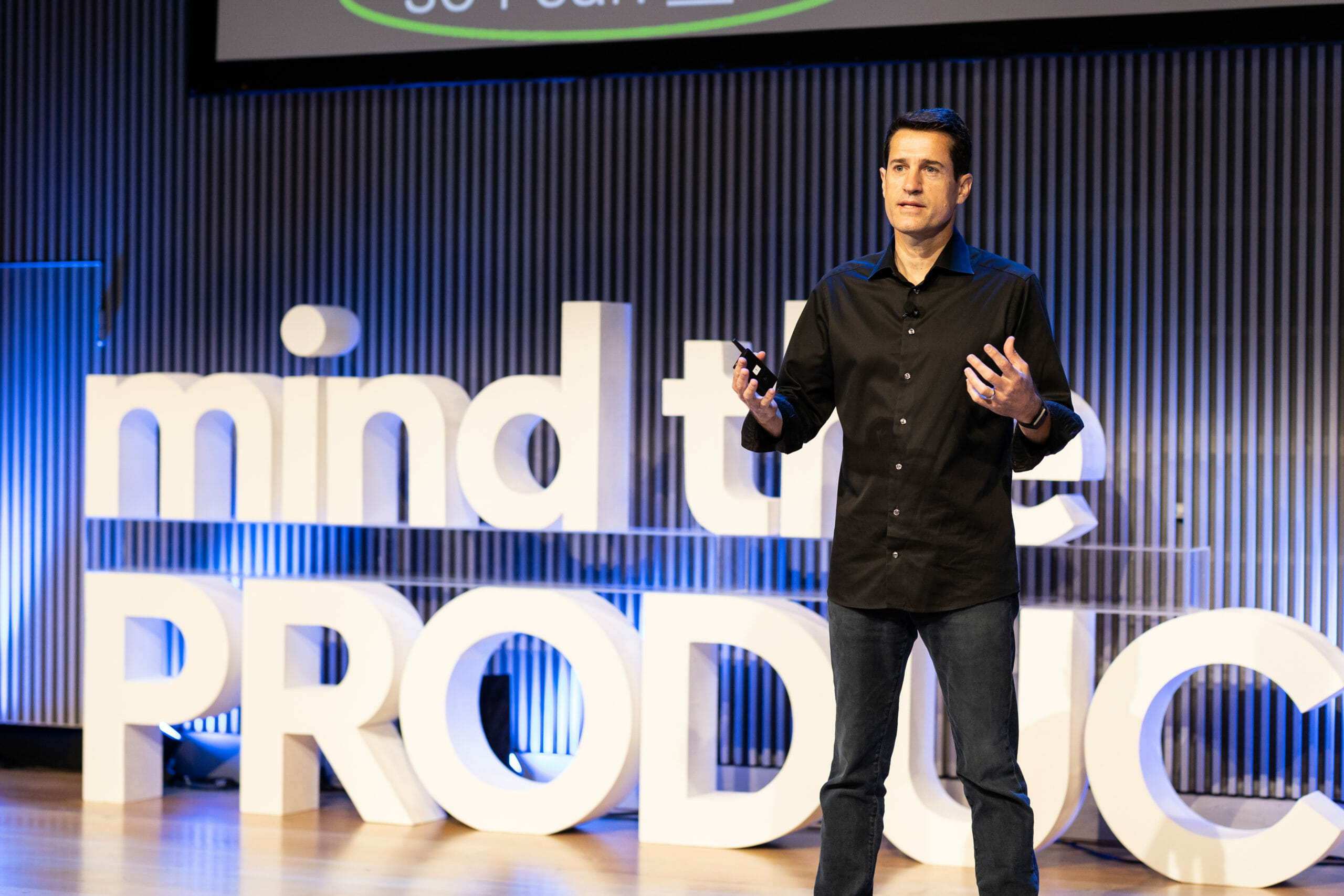Expand the sections below for more details on each workshop 👇🏼
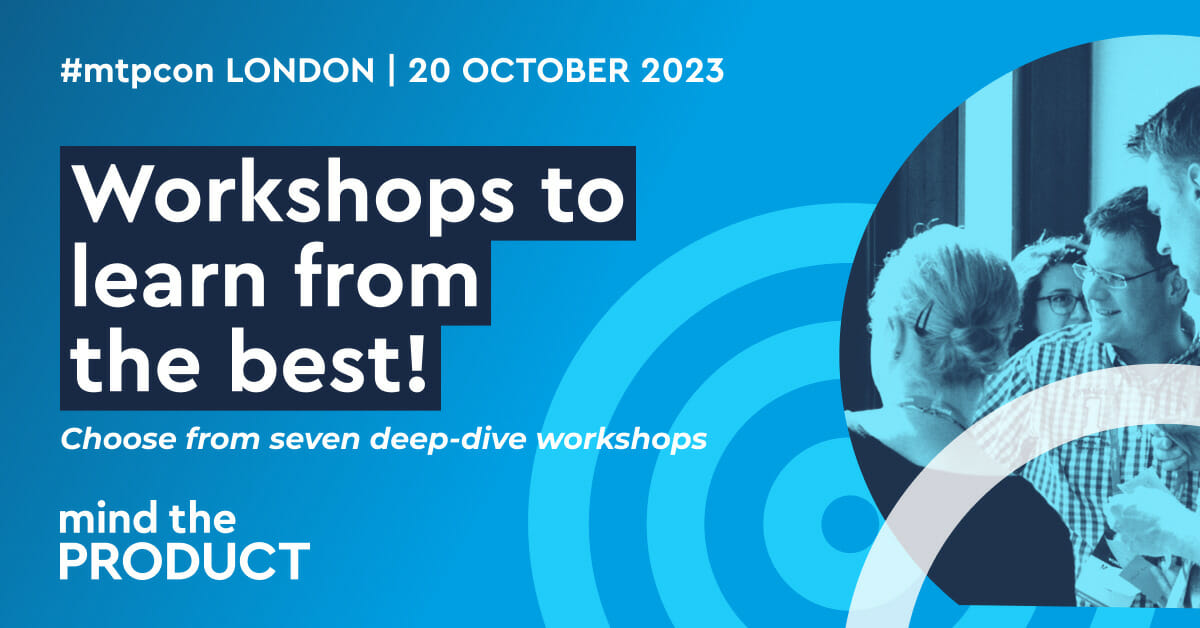 Charlotte King
VP of Product & Design at Flipdish
Charlotte King
VP of Product & Design at Flipdish

Understand your role as a product manager
Workshop overview
If you’re a working product manager in the early stages of your career it’s difficult to understand what to focus on first – our Foundations sessions will help you master the skills you need to excel in the craft of product management.
What we’ll cover on the day
Each module includes a lecture component on theory and practice, interspersed with hands-on activities where you’ll work through your own product challenges. This means that you will have the opportunity to apply and work with concepts in a setting that will answer questions and facilitate critical thinking.
- Product Development Lifecycle
- The stages of the product lifecycle and how they fit into your role
- Learning Mindsets and how they apply at each stage of the product lifecycle
- Evolving your craft as a product manager
- Goals Alignment
- OKRs vs. KPIs vs. Metrics
- Breaking down business goals for your product
- Aligning the team and organisation around goals
- The difference between business goals and product outcomes
- Hypothesis and Testing
- Crafting an effective hypothesis
- Ways to test your hypothesis
- Planning a valuable experiment
- Different type of experiment
- Components of a user interview and when to use them
- Conducting user interviews and avoiding bias
- Product Roadmapping
- Understand the purpose of a roadmap
- Determine the right structure for your product roadmap
- Facilitate a collaborative roadmap creation and update process
- Identify outcomes and themes out of features and solutions
- Leading Product Teams
- How to lead without authority
- Cultivating psychological safety
- Nurturing creativity
Key takeaways
- Know you’re doing the right stuff – Get a firm understanding of your role as a product manager – know you’re asking the right questions, and gain the confidence you need to make those all-important decisions.
- Enhance your toolkit – Learn the core overarching product processes needed for getting a good product out of the door, including the key skills, tools, and frameworks required and how to decide which ones to use and when.
- Master those all-important people skills – Learn how to hone your product management core team communication skills, how to think about “culture as product”, and in turn foster a team that is geared towards continuous improvement.
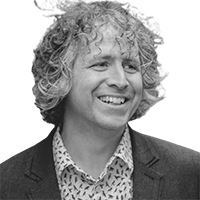
Use process to collaborate strategically across your organisation
Workshop overview
Product management comes with massive responsibility but often little authority. Our remote Communication & Alignment course teaches you how to begin adding a layer of strategy to your tactical activities in order to align your organisation around your process and vision – ensuring you have maximum impact!
What we’ll cover on the day
Each module includes a lecture component on theory and practice, interspersed with hands-on activities where you’ll work through your own product challenges. This means that you will have the opportunity to apply and work with concepts in a setting that will answer questions and facilitate critical thinking.
- Strategic Impact
- Your role as a product manager within your organisation
- The role of ‘process’ in your product practice
- The importance of influence
- Stakeholder Management
- How to build valuable relationships that benefit your product
- Identifying and mapping your stakeholders
- Extracting valuable insights from your stakeholders
- Uncovering your stakeholders’ motivations and using them to drive alignment
- Team Communication
- Build an effective communication strategy
- Break down the characteristics of your report
- Structure and format a report that serves your audience
- Identify situations where bias can influence your report
- Alignment
- Highlight the importance of alignment when presented with new opportunities
- Build a methodical, defensible framework for evaluating opportunities as a team
- Identify what information you might need to evaluate
- Prioritisation
- Different prioritisation methods and frameworks
- Prioritisation as a collaborative process
- Placing evidence-driven decision-making at the heart of your priority conversations
- Facilitating Discussions
- Techniques to drive conversations toward decisions and action
- Identifying facilitation best practices
- Crafting a successful workshop/collaboration session
Key takeaways
- Get strategic – Gain a firm understanding of how to add a layer of strategic thinking to your day-to-day grounded, tactical activities – because product management is inherently a strategic role.
- Know which tools to pick – Understand the variety of frameworks and tools that are at your disposal, how to decide which one to choose, and that there is no ‘one size fits all’ product solution.
- Take everyone with you on the journey – Learn how to engage your team and stakeholders early on in the product process so that they can be a supporter of the vision that they’ve helped co-create, ensuring that your product gets out the door!

Get a user-centered approach to measurement
Workshop overview
As Marty Cagan, the author of Inspired, and the godfather of modern product management has said – “as product managers, it is our job to discover that which is valuable, feasible, viable, and usable”. We can only know if we’ve achieved those aims by measuring our progress in some way – so metrics and product analytics are critical to building successful products.
In Metrics for Product Managers we will cover all the fundamentals that a product manager needs to know about metrics. We focus on the role that you as the product manager should play in the metrics process, how to manage teams so that you can collaboratively track towards success, and how you can drive better data-driven decisions and insights.
During the course, you’ll take the theory you learn and craft your own metrics plan based on your product and work – collaborating with your peers & trainer as you build. You’ll go back to work empowered to apply your plan, and ready to drive towards even greater products!
What we’ll cover on the day
Each module includes a lecture component on theory and practice, interspersed with hands-on activities where you’ll work through your own product challenges. This means that you will have the opportunity to apply and work with concepts in a setting that will answer questions and facilitate critical thinking.
- What do we measure and why?
- The importance of metrics
- Your role as a product manager in metrics
- How other organisations measure
- Building evidence-driven culture
- Crafting Metrics
- How to create quality metrics that fit your company strategy
- The difference between common metrics frameworks
- Using the North Star metric
- Key Metrics Concepts
- The different types of metrics and when to use them
- How to understand customers and behaviour
- The jargon of metrics
- Creating your Metrics Plan
- An overview of the metrics process
- Breaking down business goals into actionable metrics
- Building out your metrics plan using our Metrics Planning Canvas
- Risks
- Considering what can go wrong with metrics
- Common biases
- Crafting Check Metrics to guard against unintended consequences
- Operationalising Metrics
- Implementing metrics tracking
- The importance of communication in the metrics process
- When and how to report on your metrics
Key takeaways
At the end of the workshop, you will understand how product managers work with metrics. You’ll go away with pragmatic, actionable insights that tie back into your job as a product manager, and specific details and scenarios about working with cross-functional teams to implement metrics tracking. You’ll also have a good understanding of the “One Metric that Matters” concept for various types of business models and stages.

Use maps to understand complexity and spot opportunities
Workshop overview
Product managers work within a complex landscape of organisational systems and processes, all intertwined and dependent on one another. As the product manager, your job is to help your team navigate these systems to uncover friction and opportunities, and drive action.
Mapping is an invaluable learning and communication tool you can use to break down any system, flow or process into digestible elements. This process will empower you to work through problems visually with your team, pulling apart complexity to uncover the next most valuable action.
What we’ll cover on the day
During the course of this workshop, you will build your own map using a product problem or challenge from your own career. We have designed this workshop so that you take the learnings from each of the below modules and apply it right away using your own map, enabling you to fully grasp the concept of mapping. The opportunity to collaborate with your trainer and peers as you build your map is an invaluable way to get feedback and learn from your classmates.
- Introduction to Systems Thinking – An overview of mapping, its origins in systems thinking, and how it can be used in your organisation
- Problem Definition – Setting a goal for your map (what problem are you trying to work through, or what opportunity are you trying to uncover)
- Key Elements of a Map – Understanding the different components of maps, how they can fit together, and where to start
- Building your Map – Working through your own challenges by building your own map, with class discussions about how your peers are applying this thinking to their own work
- Mapping Process – Different approaches to maps, how to map when you have gaps in your knowledge, and processes for different mapping scenarios
- Mapping Outcomes – Effectively facilitating your map towards actions and leveraging your map for maximum impact
- Mapping Culture – What a mapping and systems thinking culture looks like, how you can ensure internal support of the mapping process, and an overview of map facilitation techniques
Key takeaways
- Visualise complexity and spot opportunity – Use mapping as a tool (and a mindset!) to help you break down any system or process in order to work through challenges and uncover value, while maintaining visibility of the complex ecosystem your product sits within.
- Foster a mapping culture – Confidently support yourself and your team to grapple with overwhelming problems and ideas by taking systems thinking approach and embracing your ever-evolving role as the facilitator in the mapping process.
- Drive toward action – Uncover the next most valuable step in pulling apart a complex problem, driving your team towards action, and ultimately, great products!

Using the Decision Stack as a mental model to drive efficient and aligned decisions within your role, team, and organisation.
Workshop overview
The Decision Stack is a mental model which helps align organisations from top to bottom, and bottom to top – increasing decision-making velocity and quality throughout! Currently being used around the world in large complex organisations as well as fast-paced start-ups, this Decision Stack Workshop will help you connect the dots all the way from vision/mission through to every daily decision made in our companies. Leaders can make the necessary connections between existing theories around vision, strategy, and execution layers and understand how important they are to a cohesive approach. Individual team members can truly understand how their work connects to the bigger picture – and how to challenge their leadership where that clarity is lacking.
Using a mix of short lectures, hands-on activities, and group discussions, Martin Eriksson will teach you how to consider your full Decision Stack and deep dive into the two most challenging aspects: defining your strategy and defining your principles. Most importantly this workshop will help you understand your role in bringing these concepts back to your team in order to drive alignment and make better decisions.
What we’ll cover on the day
- What is the Decision Stack – understanding it as a mental model
- Defining Strategy and Product Strategy – understanding your role in defining strategy at any level of the organisation as well as practical tips for defining your product strategy
- Product Principles – how they work and what they might help you achieve – along with practical activities to help you draft your principles
- How to bring the product strategy and principles thinking back to your organisation – making a plan for working towards clarity within your team and the wider company
Key takeaways
- How to own strategy at any level and how to help your team own strategy together
- How to use principles to make and codify decisions
- How to collaborate with your team to drive efficient decision-making in your organisation
Things to note
- In order to make the most of this workshop we will be sending some simple pre-work questions to consider prior to the workshop
- Please remember that strategy (company, product, or otherwise) is nuanced and complex. This workshop will provide some tools and ideas for you to get started, but you probably won’t walk away with a perfectly crafted strategy

How to use Adaptable Discovery practices to solve user problems that drive business results
Workshop overview
This training allows teams and individuals to learn the critical skills needed to adopt, professionalize, and scale Product Discovery independent of their industry or company size.
Product Discovery is more than talking to users. But it’s easy for teams to be held back by an overwhelm of frameworks and “do it right.” When the thing matters are their iteration toward reducing uncertainty.
If you strip away all the frameworks, buzzwords, and “best practices,” the core intention of Product Discovery is about the data-informed reduction of uncertainty regarding problems worth solving and solutions worth building through a series of nonlinear activities conducted as a cross-functional team.
That’s why this workshop focuses on helping you understand individual Discovery context and when to apply what technique to make progress, over just introducing new canvases or frameworks.
What we’ll cover on the day
- Dual-track agile
- Product dicovery OKRs
- Product Discovery Collaborator Model
- Product discovery check-ins
- Alignment one-pager formats
- Impact mapping
- Research intent questions
- Research and testing technique categories
- Idea Validation Grid
Key takeaways
- Frame your Product Discovery through Strategy, OKRs, and Product Roadmaps to identify and prioritize the right Problem Space.
- Structure product discovery participation and day-to-day integration
- Articulate research intent to choose and combine the proper research techniques for your problem with a short lead time to insight.
- How to plan, execute, and synthesize qualitative and quantitative research to generate reliable problem understanding
- Using Impact Mapping to connect insights, solutions, and experiments to overarching business goals.
- Develop a structure for testing generated ideas to enable evidence-informed decision-making.

Lean Product Management: How to Achieve Product-Market Fit
Workshop overview
In this training workshop, product management expert Dan Olsen will teach you best practices in product management. He will share advice from his bestselling book The Lean Product Playbook, including the Product-Market Fit Pyramid: an actionable model that breaks product-market fit down into 5 key elements. Dan will also explain the Lean Product Process, a 6-step methodology that guides you through how to:
- 1. Determine your target customer
- 2. Identify underserved customer needs
- 3. Define your value proposition
- 4. Specify your MVP feature set
- 5. Create your MVP prototype
- 6. Test your MVP with customers
Dan will also cover analytics. His highly interactive workshop will be filled with real-world case studies and small group exercises. You’ll leave this workshop with pragmatic advice and tools you can put to work right away.
False #mtpcon London #mtpcon London Mind the Product Mind the Product Ltd https://www.mindtheproduct.com/mtpcon/london/workshops/
#mtpcon #mtpcon London
https://www.mindtheproduct.com/mtpcon/london/
2022-10-13
2022-10-14
#mtpcon London
#mtpcon London
On Friday 20th October, the biggest celebration of product innovation at #mtpcon happened! We enjoyed a jam-packed day, full of product inspiration.
At #mtpcon, we brought together the most brilliant minds in product, our incredible speakers – to share their insights and expertise with you. Plus,
Presenters and panelists
https://www.mindtheproduct.com/mtpcon/london/workshops/
#mtpcon #mtpcon London
https://www.mindtheproduct.com/mtpcon/london/
2022-10-13
2022-10-14
#mtpcon London
#mtpcon London
On Friday 20th October, the biggest celebration of product innovation at #mtpcon happened! We enjoyed a jam-packed day, full of product inspiration.
At #mtpcon, we brought together the most brilliant minds in product, our incredible speakers – to share their insights and expertise with you. Plus,
Presenters and panelists
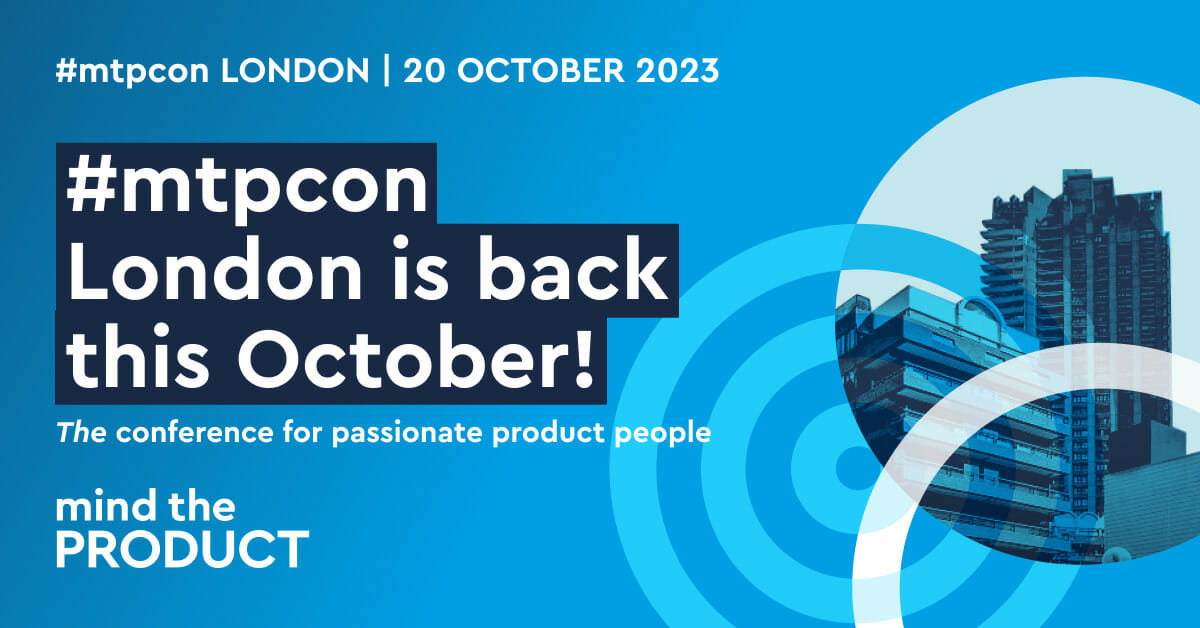 In stock
>
In stock
>
